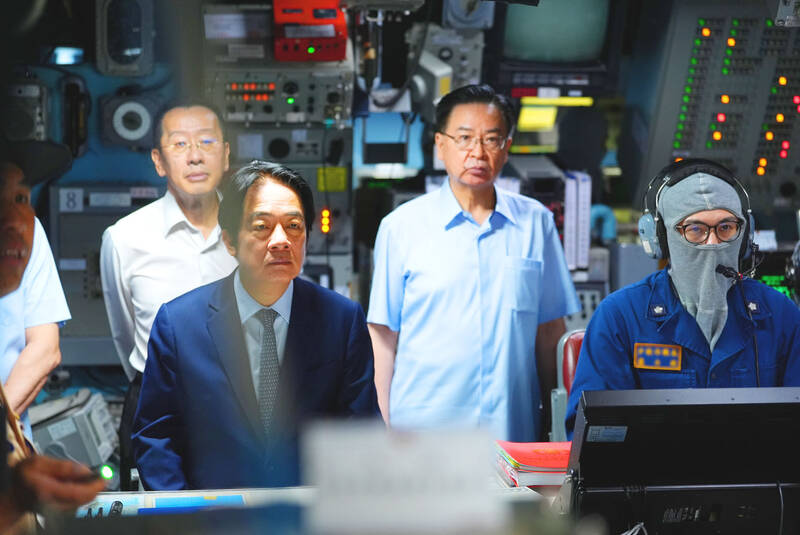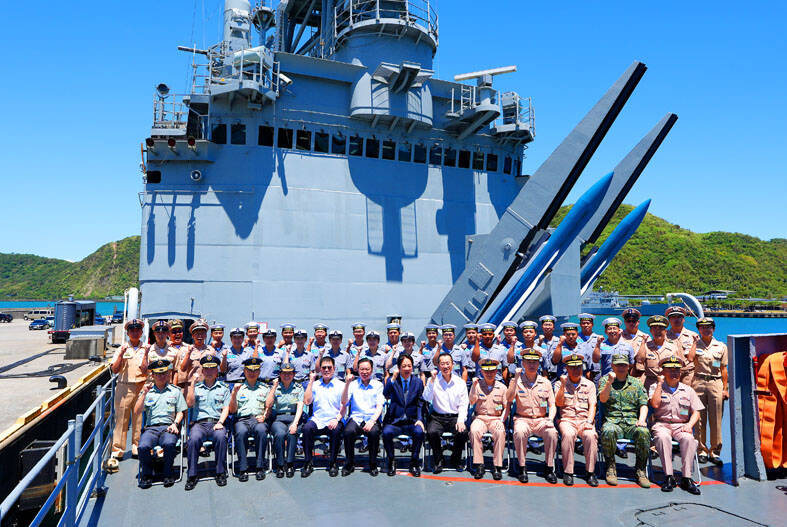President William Lai (賴清德) yesterday said he hoped defense spending would reach 5 percent of GDP before 2030, a day after the Cabinet announced that next year’s proposed defense budget would hit the highest ratio since 2009.
Next year’s defense budget would reach 3.32 percent of GDP, including expenditures for veterans’ affairs and the coast guard, Premier Cho Jung-tai (卓榮泰) said on Thursday, adding that the new calculation method followed NATO standards.
Taiwan faces calls from Washington to spend more on its own defense, mirroring pressure from the US on Europe.

Photo courtesy of the Presidential Office
Visiting the navy’s 168th Fleet in Yilan County, Lai said that in view of rising threats from China, he hoped “defense spending could reach 5 percent of GDP before 2030, in line with NATO standards.”
“This not only demonstrates our country’s determination to safeguard national security and protect democracy, freedom and human rights,” he said. “It also shows our willingness to stand shoulder-to-shoulder with the international community to jointly exert deterrent power and maintain peace and stability in the Indo-Pacific region.”
The government would push for cooperation with international allies on weapons research and development as well as production, Lai said, although he did not give details.

Photo courtesy of the Presidential Office
Taiwan will continue to procure weapons for a high-grade military arsenal, including next-generation frigates to replace the old Knox-class frigates, also known as the Chi Yang-class, he added.
The US is Taiwan’s most important international arms supplier, but the nation’s domestic weapons industry has built everything from fighter jets to cruise missiles.
Asked about the omission of pay raises for military personnel from next year’s budget, Lai said that the additional increases approved by the legislature involve constitutional issues and would require a ruling by the Constitutional Court before further decisions could be made.
However, regardless of the outcome, the government would “find a way” to improve military benefits and pay, he added.
On Thursday, the proposed central government budget announced by the Executive Yuan did not include a NT$30,000 monthly allowance for voluntary military service members and higher salaries for those in combat units, as stipulated in amendments to the Pay Act of the Armed Forces (軍人待遇條例) passed in June.
In announcing the decision, Cho said that once the budget is formally submitted, the Executive Yuan would seek a constitutional judgement of the amendment and adjust the budget depending on the outcome.
Lai said that if the measures are found to be constitutionally sound, the government would provide retroactive compensation.
He also said that after taking office, he approved a request from Minister of National Defense Wellington Koo (顧立雄) to increase military personnel’s salaries, which has already been included in this year’s budget.
Additional measures would also continue to support national defense autonomy and industry to bolster the nation’s defense capabilities, he added.
The government would continue to build and improve military housing and camps, upgrade outdated infrastructure and support any further requirements from the armed forces, Lai said.

MAKING WAVES: China’s maritime militia could become a nontraditional threat in war, clogging up shipping lanes to prevent US or Japanese intervention, a report said About 1,900 Chinese ships flying flags of convenience and fishing vessels that participated in China’s military exercises around Taiwan last month and in January last year have been listed for monitoring, Coast Guard Administration (CGA) Deputy Director-General Hsieh Ching-chin (謝慶欽) said yesterday. Following amendments to the Commercial Port Act (商港法) and the Law of Ships (船舶法) last month, the CGA can designate possible berthing areas or deny ports of call for vessels suspected of loitering around areas where undersea cables can be accessed, Oceans Affairs Council Minister Kuan Bi-ling (管碧玲) said. The list of suspected ships, originally 300, had risen to about

DAREDEVIL: Honnold said it had always been a dream of his to climb Taipei 101, while a Netflix producer said the skyscraper was ‘a real icon of this country’ US climber Alex Honnold yesterday took on Taiwan’s tallest building, becoming the first person to scale Taipei 101 without a rope, harness or safety net. Hundreds of spectators gathered at the base of the 101-story skyscraper to watch Honnold, 40, embark on his daredevil feat, which was also broadcast live on Netflix. Dressed in a red T-shirt and yellow custom-made climbing shoes, Honnold swiftly moved up the southeast face of the glass and steel building. At one point, he stepped onto a platform midway up to wave down at fans and onlookers who were taking photos. People watching from inside

Japan’s strategic alliance with the US would collapse if Tokyo were to turn away from a conflict in Taiwan, Japanese Prime Minister Sanae Takaichi said yesterday, but distanced herself from previous comments that suggested a possible military response in such an event. Takaichi expressed her latest views on a nationally broadcast TV program late on Monday, where an opposition party leader criticized her for igniting tensions with China with the earlier remarks. Ties between Japan and China have sunk to the worst level in years after Takaichi said in November that a hypothetical Chinese attack on Taiwan could bring about a Japanese

STREAMLINED: The dedicated funding would allow the US to transfer equipment to Taiwan when needed and order upgraded replacements for stockpiles, a source said The US House of Representatives on Thursday passed a defense appropriations bill totaling US$838.7 billion, of which US$1 billion is to be allocated to reinforcing security cooperation with Taiwan and US$150 million to replace defense articles provided to the nation. These are part of the Consolidated Appropriation Act, which the US House yesterday passed with 341 votes in favor and 88 against. The act must be passed by the US Senate before Friday next week to avoid another government shutdown. The US House Committee on Appropriations on Monday unveiled the act, saying that it allocates US$1 billion for the Taiwan Security Cooperation Initiative